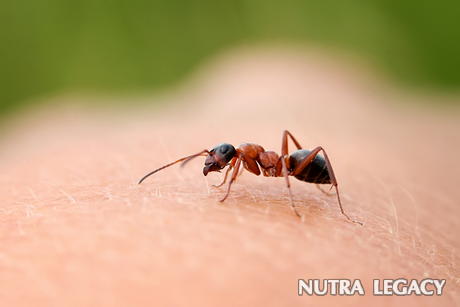Top 5 Natural Ant Bites Treatment Methods
In this article you will learn:

- How to treat ant bites, naturally
- Using items from around the house to treat ant bites and other common bites from insects
- What to do about the pain of ant bites
Many of the best ant bites treatment methods are totally natural. They are made from things you routinely have right in your own home. Many of the methods listed below are insect bites treatment methods which work for all types of insect irritation. All of them are unequivocally helpful in dealing with ant bites.
Ants are annoying little critters – except for when they bite. For such tiny insects, they certainly can cause a lot of discomfort! Fortunately there are a number of different ant bites treatment options available, many of which are completely natural. Sometimes, natural insect bites treatment methods are the best. After all, with ant bites, bee stings, or any other type of insect bites, it typically happens at home, and you may not have time to go running to the store to get some relief. The ant bites treatment options listed below are completely natural, comprised of items you likely just have lying around the house!
Treatment Method #1: Fruits and Vegetables
That is something of a catch all cure, because there are quite a few fruits and vegetables which can be helpful with ant bites – or at least their extracts and juices can be beneficial. For instance, you can put lemon juice, straight, onto the bite of an ant. The acidity can neutralize and counteract the acid found in the bite. Similarly, a poultice made from lemon balm – its leaves, crushed – and water can soothe the bite of an ant. You can also simply place a slice of cool cucumber onto your ant bite. Likewise, you can cut a clove of garlic or an onion and place it on the site of your bite. Then, after you have done so, squeeze on some cucumber juice for added soothing.
Treatment Method #2: Aloe Vera
Aloe Vera is used in a number of insect bites treatment methods – actually, it is also beneficial with a number of general painful skin conditions, such as sunburns and rashes. It can help with bee stings and bites from those pesky little ants. The juice of the plant in particular is soothing. All you need to do is cut one of the plant’s leaves open and then squeeze the juice out onto your bite. You can also get the gel from the plant, which will draw out any lingering infection.
Treatment Method #3: Baking Soda
Making a paste out of baking soda and water is probably the most common and well know ant bites treatment. Literally all you have to do is make a paste, and then apply it directly to your bite. In addition to dealing with the pain, it will also make the wound itch less. As many of us know, this is also a preferred treatment option for bee stings.
Treatment Method #4: Clay
Mixing clay and water is also an effective ant bites treatment. All you have to do is make a paste of water and clay and spread it directly on the site of your ant bite. It will soothe the pain and burn of the bite. It will also relieve the itching.
Treatment Method #5: Tea Bags
As mentioned, the bite of the ant is quite acidic. Tea – or, more correctly, tea bags – is another effective ant bites treatment which works to neutralize that acid. Tea contains tannic acid, which works as the neutralizer. Most people say that black tea works best. All you have to do is place the tea bag against the bite.
The information supplied in this article is not to be considered as medical advice and is for educational purposes only.
|
2 Responses to “Top 5 Natural Ant Bites Treatment Methods” | ||||||||||||||





 5 Jul 2009
5 Jul 2009
Are some of these remedies better for certain ant bites than others? For example, I know there are two main types of biting ants - carpenter ants and fire ants. Would the treatment methods for these bites differ?January 24th, 2011 at 10:48 pm
Are some of these remedies better for certain ant bites than others? For example, I know there are two main types of biting ants - carpenter ants and fire ants. Would the treatment methods for these bites differ?January 24th, 2011 at 5:48 pm